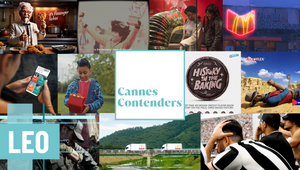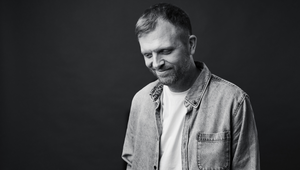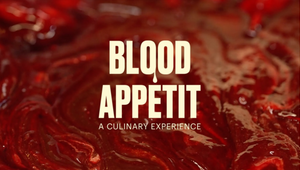
Harder, Better, Faster Stronger: Why Publicis Groupe’s Dave Bowman is Upbeat about the Industry

Sometimes you can be too close to something to really appreciate the change and growth that it’s undergone. Having spent five years away from the agency world, overseeing some of Google’s most exciting innovative projects in APAC, Dave has come back to the industry with fresh eyes. And what he’s seen is an industry that’s leaner, faster and more agile - leaving parts of the tech industry in the dust with its sense of urgency.
Just over a year ago, he came back to adland as the chief creative officer of Publicis Groupe for Australia and New Zealand, when CEO Michael Rebelo realised he’d need a CCO to help finish bringing together that connected Groupe-wide model at a creative level.
Dave initially moved to Google in 2017 with his long-term creative partner Matty Burton (now CCO at DDB Group Aotearoa NZ). The pair had initially raised eyebrows with the move, as co-founding partners of Special Group, which had really hit its stride. At Google, Dave was running the Partner Innovation Team, working on the most critical client relationships across 19 APA markets. Dave says he worked on projects of strategic or cultural importance, finding himself doing everything from building apps and experiences to working with medical researchers. “So on an average day - there was no average day!”
As fun as his time at Google was, the approach from Michael had come at the perfect time - he was yearning for the hunger and hustle of the ad industry. “I always felt I was learning, which is great, but eventually I just missed the energy of the business that I’m back in, there’s an urgency about that. I feel like, in the tech world, there are some parts of the businesses that are very urgent, and other parts where people could really put their feet up and chill - probably why you saw a bunch of redundancies happening in some of those industries these last few months. I think they would realise that there were sometimes two streams of speed!”
Dave found himself stepping into an industry that had transformed considerably in his absence. Publicis Groupe itself, of course, had completely restructured itself into a more future-facing shape. But, more broadly, Dave also found an industry full of resourceful, eager fighters.
“In the beginning, I was trying to familiarise myself with lots of different things and then also reappraise lots of things that I’ve previously been familiar with, but whose shape has changed over the last few years, particularly with Covid. In that bucket I’d put creative agencies, definitely, because - and I think this is a bit of a universal thing - I think the industry hemorrhaged a lot of people in the last few years creatively – and I think that’s a shame.”
“But I would say, I feel like the survivors and the people who’ve been excited about the massive change that’s come through are amazing. Those people who have rebuilt themselves and rebuilt the companies in which they work.”
Dave has returned to the industry and plunged straight into the next transformation - the artificial intelligence revolution. Publicis Groupe has been very much at the forefront of this change, setting out its stall in January with a €300 million investment. investmenthttps://lbbonline.com/news/why-publicis-groupe-is-investing-300m-into-its-ai-ambitions That enthusiasm for the future and the creative potential of technology is something that Dave really admires about the industry. The onset of AI is just the latest chapter in an ongoing story of disruption and new technology. He recalls the suspicion that arose when Photoshop first came on the scene. He reflects that now, as then, that the industry is full of those who are curious and keen to play.
“I think it’s an exciting industry to be a part of. Particularly now,” he says. “There are definitely those two schools of people who are terrified of the future and then the people who are quite excited about it. I do think advertising has its unfair share of people who are excited about it. If you look at society, people.”
When it comes to AI specifically, Dave feels that there’s a real opportunity to get creative about finding new ways to engage with people, as his colleagues at Publicis Groupe demonstrated earlier in the year when they sent out 100,000 videos, each tailor made for every Groupe employee around the world.
“That’s where it gets interesting. Rather than use it to fire spam at people, what are the things that you can feed in there to engage in new ways?” says Dave. “I still feel like personalisation at scale has so much more [to go]. It’s clearly been a thing that has been talked about for so long, and the work that stands alongside it is so boring. It’s like doing a presentation on knowing where everyone’s letterbox is… If you’re still putting something annoying through the letterbox it’s all for nothing. I feel like the more we can tap back into culture and actually what drives it and hold ourselves a bit more accountable to what work we’re putting into that world, then the more fun it’s going to be and the better the output.”
In terms of client appetite for AI currently, Dave says there’s a spectrum, with some quite content with the traditional way of doing things for now at one end. At the other, there are the clued-up clients willing to push things forward but urging caution at the same time, aware of the uncertainties and potential pitfalls and therefore keen to work out their strategy and to make sure they’re thinking ‘a few steps ahead of where we’re going’. Most, he says, are somewhere in the middle, with AI deployed within other business functions if not yet marketing.
“For me, the most interesting thing is when clients are open-minded to having a conversation about it, starting to try and think, ‘what might my version of something from that world look like?’ Doesn’t have to be now, but down the road,” says Dave.
Reflecting on the current overall situation in the Australian and New Zealand markets, Dave’s feeling some of the energy and urgency he’s noticed in the advertising industry in the broader economy. He says that New Zealand has had a somewhat tougher time bouncing back from Covid and a difficult economic climate while Australia “came out of the other side of some financial challenges with a bit more momentum”. However, in both, he says that ‘cost of living pressures’ are on the increase.
Despite that, that sense of urgency is palpable and Dave reckons that the coming year will see that materialise in the creative work. Ultimately, for an industry that can be quite good at beating itself up and being self critical, Dave’s overall view is that adland has been through a lot of change and is full of exactly the kind of tenacious, can-do innovators you’d want by your side as you face the future.















